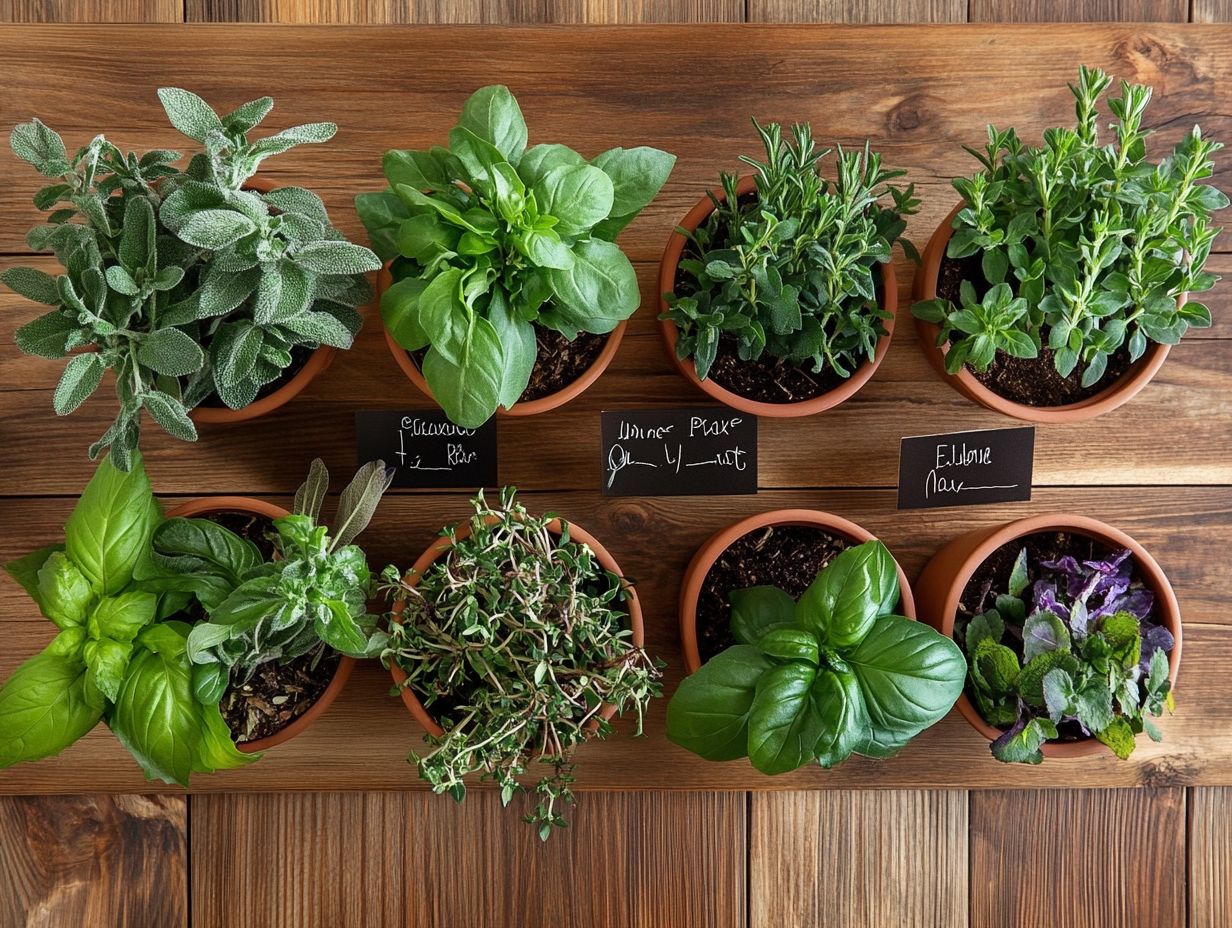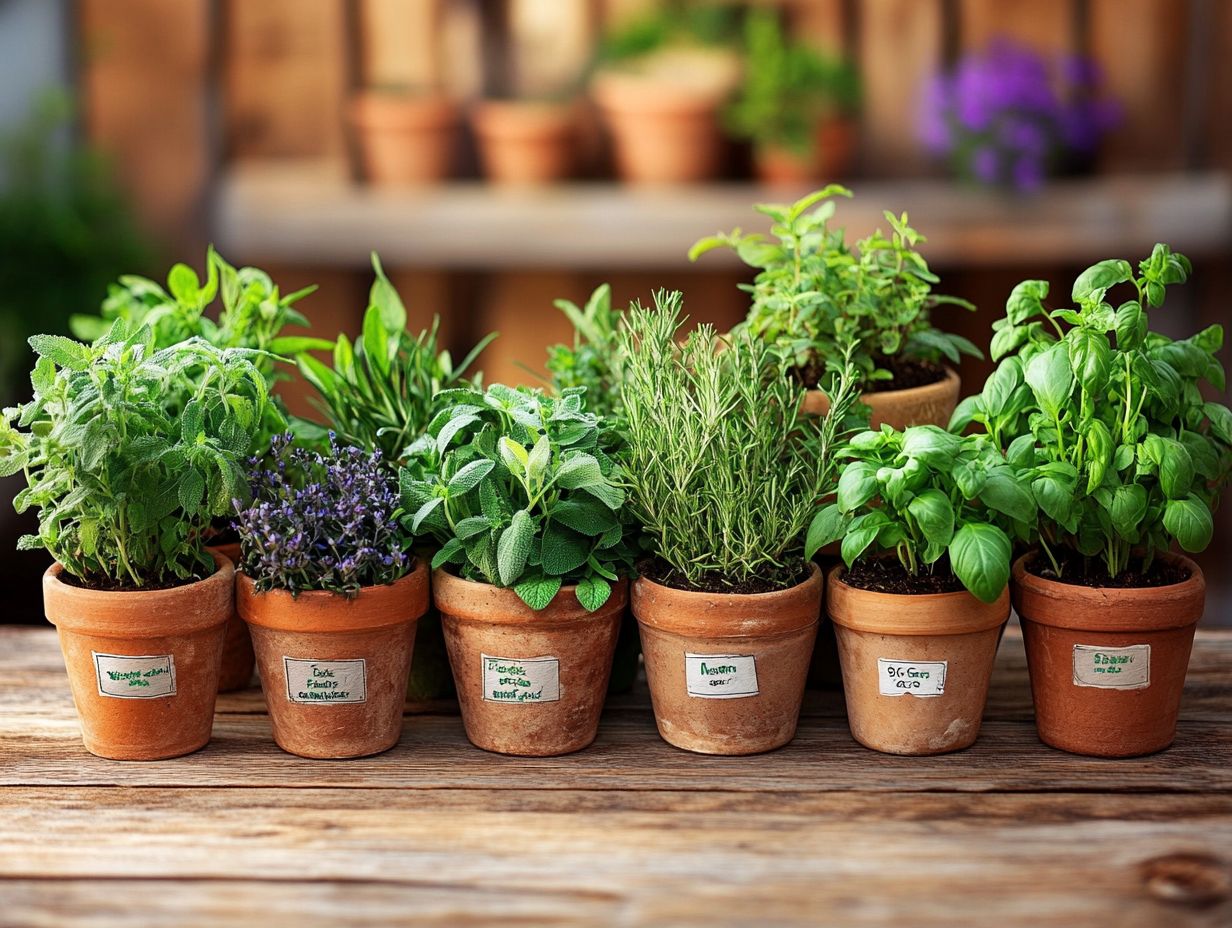32. 10 Herbs for Integrative Health Practices
In a world that increasingly embraces holistic wellness, the importance of herbs in health practices is gaining remarkable traction.
From the vibrant yellow of turmeric to the comforting warmth of cinnamon, these natural treasures present a variety of benefits that can significantly enhance your well-being.
This article delves into ten powerful herbs, such as ginger and ashwagandha, that support physical health and help balance the mind and spirit. You ll discover how to seamlessly incorporate these herbs into your daily routine, recognize any potential risks, and dispel common myths surrounding their use.
Start your exciting journey to a harmonious lifestyle today!
Contents
- Key Takeaways:
- 1. Turmeric
- 2. Ginger
- 3. Garlic
- 4. Cinnamon
- 5. Ashwagandha
- 6. Holy Basil
- 7. Licorice Root
- 8. Milk Thistle
- 9. Echinacea
- 10. Ginkgo Biloba
- What Is Integrative Health and How Can Herbs Be Used in This Practice?
- What Are the Benefits of Using Herbs for Integrative Health?
- What Are the Potential Risks and Side Effects of Using Herbs for Integrative Health?
- How Can One Incorporate Herbs into Their Daily Routine for Optimal Health?
- What Are Some Common Myths About Herbs and Integrative Health?
- What Are Some Other Popular Herbs Used in Integrative Health Practices?
- Frequently Asked Questions
- 1. What are integrative health practices?
- 2. Why are herbs important in integrative health practices?
- 3. What are some common herbs used in integrative health practices?
- 4. Are there any potential risks or side effects associated with using herbs?
- 5. How can I incorporate these herbs into my daily routine for better health?
- 6. Can these herbs be used as a replacement for prescribed medication?
Key Takeaways:

Turmeric, ginger, garlic, cinnamon, and ashwagandha are some of the top herbs used in integrative health practices.
Herbs have numerous benefits, including reducing inflammation, boosting immunity, and promoting overall well-being.
It’s important to consult a healthcare professional before incorporating herbs into your routine to avoid potential risks and side effects.
1. Turmeric
Turmeric, that vibrant yellow spice from the Curcuma longa plant, is not just great for cooking; it’s a powerhouse of health benefits.
Its impressive anti-inflammatory properties can help manage various health conditions, including arthritis and stomach issues. This makes it a staple in traditional medicine practices.
This revered root hails from Southeast Asia, where it has been used for thousands of years in Ayurvedic medicine to promote overall wellness.
The magic lies in curcumin, the active compound responsible for many of turmeric s remarkable effects.
Experts like Arno Kroner highlight turmeric’s ability to bolster immune function and reduce chronic inflammation. Research suggests that curcumin may also support cognitive health and offer protective benefits against certain diseases.
In the kitchen, turmeric shines not only for its flavor but also for its vibrant color, making it a sought-after ingredient in everything from curries to smoothies, enhancing both your meals and your well-being.
2. Ginger
Ginger, that remarkable root with its unmistakable flavor and aroma, is loved not just for its culinary appeal but also for its impressive health benefits.
It’s particularly effective in easing stomach issues, combating nausea, and providing anti-inflammatory effects, making it a fundamental component in both herbal supplements and traditional medicine across various cultures.
You can find ginger in many forms fresh, dried, or powdered each bringing unique benefits to enhance your culinary creations while supporting your wellness journey.
For centuries, cultures in China and India have harnessed ginger s powerful properties to address ailments ranging from colds to digestive troubles.
Recent scientific studies have confirmed these age-old practices, revealing that ginger can be particularly effective in reducing nausea, especially for pregnant women and chemotherapy patients.
Experts like Lindsay Curtis advocate for incorporating ginger into your daily diet. Fresh ginger tea and powdered extracts can play a significant role in enhancing your overall health and well-being.
3. Garlic
Garlic, that pungent bulb you often encounter in the kitchen, is more than just a flavor enhancer; it offers remarkable health benefits.
It is particularly good for boosting your immune system and supporting cardiovascular health, standing as one of the most revered healing herbs.
This unassuming ingredient is cherished across the globe, from ancient Egyptian healing practices to contemporary Asian traditions, all thanks to its impressive ability to enhance well-being.
The magic lies in its active compounds, primarily allicin, which is released when you crush or chop garlic. Allicin has significant health benefits.
Numerous studies underscore garlic’s antibacterial and antiviral properties, suggesting that incorporating it into your diet can help your body fend off various illnesses.
Experts assert that regular consumption may aid in lowering blood pressure and cholesterol levels. This highlights garlic’s significance not only in culinary circles but also in health discussions, as more individuals seek natural solutions for their wellness.
4. Cinnamon
Cinnamon, the fragrant spice that springs from the bark of Cinnamomum trees, is not just a delightful addition to your culinary repertoire; it also boasts remarkable health benefits. With its ability to reduce inflammation and support healthy blood sugar levels, it’s a treasure in both kitchens and herbal remedies.
However, it’s essential to recognize that not all cinnamon is created equal. The market primarily features two dominating types: Ceylon and Cassia.
- Ceylon, often hailed as “true cinnamon,” offers a subtle flavor and lower levels of coumarin, making it a safer choice for your daily intake.
- In contrast, Cassia is the more common and budget-friendly option, but it can contain higher coumarin levels, which may pose health risks if consumed excessively.
Cinnamon s role extends well beyond merely enhancing flavors; it has been embraced by various cultures for its reputed digestive and antimicrobial properties. Recent studies show that Ceylon cinnamon may assist in lowering cholesterol levels, while both types show potential in improving insulin sensitivity.
Experts in integrative health regard cinnamon as a flexible ingredient in dietary strategies, advocating for a balanced approach to fully leverage its benefits.
5. Ashwagandha
Ashwagandha, an adaptogenic herb that helps your body adapt to stress, is central to Ayurvedic medicine and celebrated for its remarkable health benefits, especially in reducing anxiety and relieving stress. It helps you tackle the mental health challenges of today s fast-paced world while also bolstering your immune function and overall well-being.
Its ability to help your body handle stress makes it a staple in traditional practices, where practitioners have long tapped into its powers to promote emotional equilibrium.
Recent studies are beginning to corroborate these age-old claims, shedding light on how this extraordinary herb can lower cortisol levels, which in turn diminishes feelings of anxiety.
Research supports ashwagandha’s role in enhancing resilience against stressors, making it an appealing addition to modern herbal supplements designed to address the needs of those facing everyday pressures.
With a growing interest in holistic health, ashwagandha’s applications are rapidly expanding, promising exciting opportunities to weave traditional wisdom into contemporary wellness routines.
6. Holy Basil

Holy Basil, or Tulsi, is an esteemed herb in traditional medicine systems, offering a remarkable array of health benefits. It s particularly renowned for promoting stress relief and enhancing mental clarity, making it a top choice among herbal supplements and natural wellness practices.
Its significance knows no bounds, celebrated in Indian culture as a sacred plant with deep spiritual meanings, while also finding its place in both Ayurvedic and Traditional Chinese Medicine. The herb boasts active compounds like eugenol and rosmarinic acid, believed to support emotional well-being and boost immune responses.
Experts recommend incorporating Holy Basil into your daily routine, whether through soothing teas or convenient supplements. This integration not only allows you to tap into its adaptive qualities but also helps build resilience against everyday stresses.
Its potential to enhance overall health makes it a fascinating topic for ongoing research and a popular element in wellness trends.
7. Licorice Root
Licorice root, a delightful and aromatic herb sourced from the Glycyrrhiza glabra plant, is highly esteemed for its numerous health benefits. It’s particularly valued for soothing gastrointestinal discomfort and supporting respiratory health, making it an essential component of herbal remedies and traditional medicine practices.
Throughout history, this remarkable root has found a place in various cultures, from ancient Chinese medicine to Egyptian remedies, often celebrated for enhancing digestion and alleviating coughs. The active compounds within licorice, like glycyrrhizin and flavonoids, are responsible for its therapeutic properties.
However, it s crucial to be aware of potential side effects, such as hypertension and potassium depletion, especially with excessive consumption.
To truly harness its benefits, consider incorporating licorice root into your herbal supplements or teas. This approach allows you to enjoy its soothing properties while savoring the rich flavors it adds to your wellness routine.
Discover how you can easily incorporate these herbs into your daily life for better health today!
8. Milk Thistle
Milk thistle, with its captivating purple blossoms, is celebrated for its remarkable health benefits. It is especially known for promoting liver health and aiding detoxification. This powerful herb contains silymarin, a compound that helps protect liver cells by reducing inflammation and damage caused by free radicals.
Historically, silymarin has been a staple in herbal medicine for centuries, tracing back to ancient Greece and earlier. It was treasured for its protective properties against a range of liver ailments.
Recent research supports these age-old claims. Numerous studies showcase its potential effectiveness in enhancing liver function and aiding recovery from liver disease. This expanding body of evidence positions silymarin as a valuable ally for those looking to naturally bolster their liver health.
9. Echinacea
Echinacea, that striking flower known for its immune-boosting prowess, is a staple in the world of health benefits. It is particularly effective in enhancing your body s immune response while also reducing the severity and duration of pesky colds and infections. This is why many people reach for Echinacea during cold season.
You might encounter various species of Echinacea, such as Echinacea purpurea, Echinacea angustifolia, and Echinacea pallida. Each offers unique compounds that contribute to your health in distinctive ways.
Rooted in the traditions of Native American tribes, these plants have long been celebrated for their infection-fighting abilities. Research highlights active constituents like echinacoside and polysaccharides, known for their impressive immune-boosting properties.
Numerous studies back up these claims, showing that regular use of Echinacea extracts can significantly enhance your immune response. This makes it a valuable addition to your natural health arsenal, especially if you re seeking holistic support against common ailments.
10. Ginkgo Biloba
Ginkgo Biloba, one of the oldest living tree species, is highly regarded for its numerous health benefits, particularly in supporting cognitive function and enhancing memory. This makes it a favored choice among herbal supplements designed to promote mental clarity and overall brain health.
Historically, this remarkable tree has played a significant role in various cultures, especially within Chinese medicine. It has been utilized to address a wide range of ailments, from respiratory issues to cardiovascular health.
Ginkgo contains flavonoids and terpenoids. These compounds may help improve blood circulation and exhibit strong antioxidant properties. Recent studies further support the assertions regarding its cognitive-enhancing effects, suggesting potential benefits for individuals facing age-related cognitive decline.
It s essential to prioritize safety. If you re considering incorporating ginkgo into your health regimen, consulting with a healthcare professional is advisable particularly if you re on anticoagulants or have existing health conditions, as there could be possible interactions.
What Is Integrative Health and How Can Herbs Be Used in This Practice?
Integrative health offers a holistic approach to wellness, seamlessly blending conventional medical practices with alternative therapies. This includes the use of healing herbs and herbal remedies that provide a multitude of health benefits by addressing the root causes of conditions and enhancing your body s natural healing processes.
This comprehensive framework underscores the interconnectedness of your mind, body, and spirit, fostering a richer understanding of your unique health needs.
By prioritizing personalized healthcare, practitioners acknowledge that you face distinct health challenges and will respond differently to treatment.
Influential figures in this realm, such as Jamin Brahmbhatt and Arno Kroner, advocate for these principles. They promote a harmonious integration of traditional medicine and complementary therapies.
They emphasize how various medicinal plants can effectively bolster conventional treatments, enhancing your overall wellness and empowering you to take control of your health journey.
What Are the Benefits of Using Herbs for Integrative Health?

The benefits of using herbs for integrative health are extensive and diverse. They can enhance your immune system and offer natural remedies for various health issues while minimizing the side effects often tied to pharmaceutical treatments. Exploring integrative health approaches for holistic healing can further enrich your wellness journey.
Take Ashwagandha, for example. It has gained popularity for its potential to reduce stress and anxiety. Many users report remarkable improvements in mood and mental clarity after incorporating it into their daily routine. This adaptogenic herb can help you regain balance during challenging times.
Echinacea boosts your immune system. Research suggests it may shorten the duration and severity of colds, which is something to consider when you re feeling under the weather.
Integrative health practitioners frequently recommend these herbs, highlighting that a holistic approach—one that combines modern science with time-honored wisdom—can yield extraordinary results for individuals seeking integrative health benefits through natural solutions.
What Are the Potential Risks and Side Effects of Using Herbs for Integrative Health?
While herbal remedies come with a treasure trove of health benefits, don’t overlook the potential risks and side effects that can accompany their use.
Certain medicinal plants, if not used properly, might interact with medications or make existing health conditions worse. For example, garlic is often celebrated for its cardiovascular perks but may lead to gastrointestinal discomfort or increase the risk of bleeding, especially for those on blood thinners.
Turmeric is well-known for its anti-inflammatory properties. However, it can cause stomach upset or interfere with certain blood thinners. This is why it’s crucial to consult healthcare professionals before adding new herbal supplements to your routine.
Healthcare providers can offer personalized advice tailored to your unique health profile and any existing medications you re taking. By adhering to recommended dosages and monitoring your body’s response, you can enjoy the myriad benefits these natural remedies offer while ensuring your safety.
How Can One Incorporate Herbs into Their Daily Routine for Optimal Health?
Incorporating herbs into your daily routine for optimal health can be simple and effective. You can choose from herbal supplements, soothing teas, or culinary delights to harness the diverse health benefits that these natural remedies offer.
Imagine starting your day with invigorating ginger, which enhances physical vitality and mental clarity. Brew a warm ginger tea by steeping fresh ginger slices in hot water for about 10 minutes. This warming drink supports digestion and gives your metabolism a friendly boost.
As the day winds down, consider indulging in chamomile tea, known for its calming properties that promote relaxation and restful sleep. You can also add finely grated ginger to stir-fries or blend chamomile-infused honey into yogurt for a delightful treat. These effortless methods elevate your well-being while enhancing the flavors in your meals.
What Are Some Common Myths About Herbs and Integrative Health?
Numerous myths surround herbs and integrative health, leading to confusion and misinformed decisions for those exploring integrative health techniques.
You might assume that all herbal remedies are completely safe simply because they come from nature. However, experts stress that herbs, like any other substances, can carry risks and side effects especially when misused or combined with prescription medications.
Research shows that while some herbal supplements may provide benefits, they shouldn’t be viewed as substitutes for conventional treatments, especially in serious health conditions.
By understanding these nuances and seeking advice from qualified practitioners, you can make more informed choices about your health and well-being. Explore the world of herbs today and take a step toward better health!
What Are Some Other Popular Herbs Used in Integrative Health Practices?
In addition to well-known herbs like Ashwagandha and Echinacea, many other popular herbs are used in integrative health practices. Each herb offers unique benefits for your physical and mental well-being.
Experience the calming power of Lavender! This herb is often used in aromatherapy to help you relax and ease your stress.
Then there s St. John s Wort, which shines when it comes to mood enhancement. It is frequently relied upon as a natural remedy for mild depression and anxiety.
On the anti-inflammatory front, Turmeric stands out. Its active compound, curcumin, is known for reducing inflammation and supporting joint health.
You can find these herbs in teas, capsules, and tinctures, making it incredibly easy to weave them into your daily wellness routine and enjoy their holistic benefits.
Frequently Asked Questions
1. What are integrative health practices?

Integrative health practices combine traditional and alternative medicine. They promote overall wellness and treat illnesses effectively.
2. Why are herbs important in integrative health practices?
Herbs have been used for centuries in traditional medicine, offering a variety of health benefits that make them an essential part of integrative health practices.
3. What are some common herbs used in integrative health practices?
Some common herbs include turmeric, garlic, ginger, echinacea, and ginseng, among others.
4. Are there any potential risks or side effects associated with using herbs?
While herbs are generally considered safe, it is important to consult with a healthcare professional before using them. This is especially true if you have underlying health conditions or are taking medications, as some herbs may interact with certain medications.
5. How can I incorporate these herbs into my daily routine for better health?
Don’t wait! Start incorporating these herbs into your daily routine for better health today. Add them to meals or try making soothing teas.
6. Can these herbs be used as a replacement for prescribed medication?
No, these herbs should not be used as a replacement for prescribed medication. They can be used as a complementary treatment, but it is vital to consult with a healthcare professional before making changes to your medication regimen.






